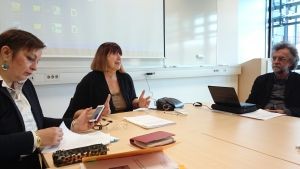Introduction Digital Danube
The Digital Danube is an Erasmus+ project (KA1 – Learning Mobility of Individuals) with participation of Public Open University Zagreb, Slovenian Third Age University, ZAWiW from Ulm University and SULSIT from Sofia. Main activities were short courses from January to April in 2015 in Zagreb, Ljubljana and Sofia. Key goal of this courses is to improve the ability to compare the various methodological approaches and existing methods and structures of the participants’ organisations and building a base for new approaches, a transfer of available knowledge and the improvement of old structures.
Also pedagogical and ICT training skills were improved as the courses abroad included not only a presentation how to teach ICT basics, but also statet crucial aspects which are important to consider when working with older adults on ICT topics: e.g. how they can integrate their use of ICT in their personal lifestyle and enriche it, what needs to be considered concerning privacy problems or which are the objections of older persons against the use of the new media, etc. The main activities were also used as partner meetings, as all partners involved sent participants to the courses abroad. So additionally to the courses on each activity, some time was safed for communication on management issues and project proceedings.Partner meeting of digital danube in Ljubljana (Tamara Jare, Slovenian Third Age Universit, Ljubljana)
 At the beginning of 2015, from 25th January till 27th January, the first in the series of Digital Danube courses took place in Ljubljana, Slovenia. The thrill was even bigger as it was the first time we met under new ERASMUS+ K1 framework.
At the beginning of 2015, from 25th January till 27th January, the first in the series of Digital Danube courses took place in Ljubljana, Slovenia. The thrill was even bigger as it was the first time we met under new ERASMUS+ K1 framework.
Slovenian Third Age University prepared a three day course to present its ”digital mission” and introduce its projects related to older people’s digital competency. Participants from Croatia, Germany and Slovenia took lessons about current U3 Ljubljana programmes for developing ICT skills in older workers. The Presentation of the structure and objectives of the EU funded project ECIL (European certificate of intergenerational learning) was linked with introduction to practical work on the online ECIL platform. Moodle for beginners was introduced ,as well the examples of good practice from Slovenian U3 :mentoring in older adult digital education , Each-one-teach-one, Cinage project and the study about Older Adult’s learning and ICT use in the Danube region. At the end of the programme participants were introduced to DANET and its best practices.
The opportunity to glimpse into the theoretical background of digital education at Slovenian Third Age University was given to our participants, but for the Slovenian staff the opportunity to make comparisons with partner organizations and initiatives from the field was also valuable. The field of ICT teaching is an emerging one for all the partner institutions, but we do still have different challenges and different approaches. This was a good starting point to think about some common ICT courses in the future and even the idea to digitally connect our learners emerged. This last aspect could be particularly interesting from the DANET optics, digital environment could become a common learning environment alongside the Danube, and at least something DANET should have in mind for the future.
Exotic is the idea in Bulgaria to create Universities of the Third Age? (Mariela Nankova, SULSIT, Sofia, Bulgaria)
 Experts from Bulgaria, Slovenia, Croatia and Germany sought the answer to this question during the three-day seminar “Digital Danube”, held on 16, 17 and 18 April 2015 State University of Library Studies and Information Technologies hosted the event within the Erasmus program + K1 activity. Participants were welcomed by Prof. Ivanka Iankova, Dean of Facultee of Library Studies and Information Technologies and chairman of the Association of University Libraries and Prof. Dr. Tanya Todorova, Head of Department “Library Management”. Coordinator of the project by the SULSIT was Assoc. Prof. Dr. Mariela Nankova, who presented the university and its mission and structure.
Experts from Bulgaria, Slovenia, Croatia and Germany sought the answer to this question during the three-day seminar “Digital Danube”, held on 16, 17 and 18 April 2015 State University of Library Studies and Information Technologies hosted the event within the Erasmus program + K1 activity. Participants were welcomed by Prof. Ivanka Iankova, Dean of Facultee of Library Studies and Information Technologies and chairman of the Association of University Libraries and Prof. Dr. Tanya Todorova, Head of Department “Library Management”. Coordinator of the project by the SULSIT was Assoc. Prof. Dr. Mariela Nankova, who presented the university and its mission and structure.
On April 17, 2015, the participants visited the City Library and got introduced to the Bulgarian experience in training for adults 60+ to acquire ICT skills. The meeting was opened with a keynote speech by the Director of the City Library Dr. Julia Tsinzova. The meeting was attended by Marchela Borisova, Head of “Library Services” and all trainers in the program “Global Libraries – Bulgaria”.
Assoc. Prof. Dr. Dobrinka Stoykova made presentations on “Concepts of the role of librarians in the training of senior citizens Information and communication skills” and “Good practices in training senior citizens 60+ of ICT skills in Bulgaria”. Presented was the experience of the community center and regional libraries within the program “Global Libraries – Bulgaria” and organized by SULSIT Academic day for adults 55+ on project DASUN. Interest in the topics was very large. It was a fruitful discussion. Then the guests visited the German, Spanish, Turkish, Korean and reading American corner.
On 18 April 2015 the program continued with a presentation on the experience of participants from Ljubljana, Zagreb and Ulm in the organization and work with students at the University of the Third Age, as well as practical aspects of adult education; presented were results of the Feasibility Study, conducted among the partner organizations of the Danube region in the field of digital literacy and the prospects of work in the new network DANET universities in the Danube region.
The workshop achieved its objectives, namely: exchange of experience between the partner organizations, obtain an overview of best practices in the field of training the elderly; characteristics of formal and informal education and higher education for adults; familiarization with new ICTs as one of the key competences in the implementation of training programs under the “Lifelong Learning”. Saying farewell the participants were impressed by the organization of seminars and cultural attractions of Sofia.
Learning Outcomes
Not only methodological knowledge was gained, but also the insight in the European partner countries and their work conditions provided skills in intercultural communication and project managament in the Danube Region. The ability to compare the various methodological approaches enabled the valuation of the hitherto existing methods and structures of the participants’ organisations and built a base for new approaches, a transfer of available knowledge and for improvements of old structures. Also pedagogical and ICT training skills has been improved as the courses abroad did not only show how to teach ICT basics, but also what crucial aspects are important to consider when working with older people.
